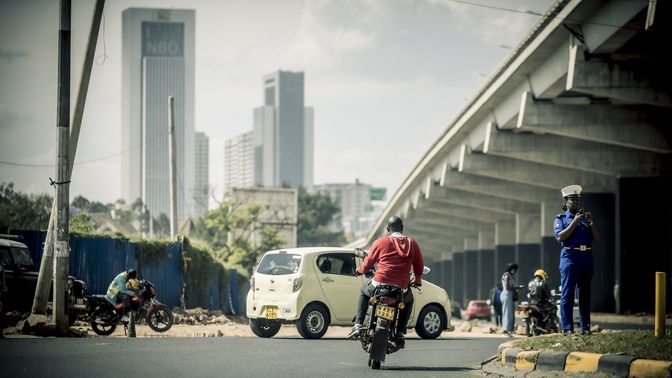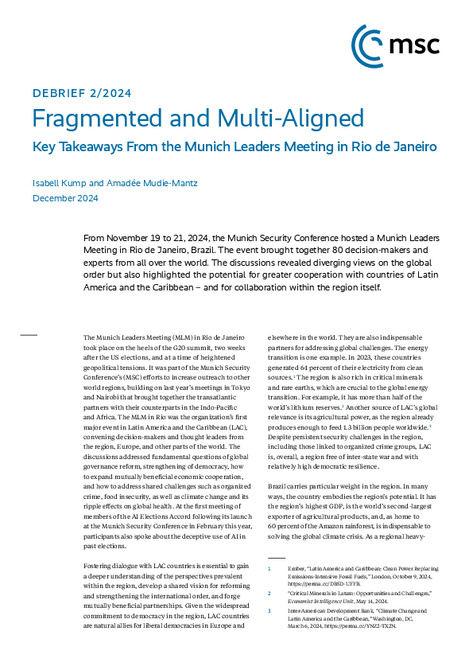

Fragmented and Multi-Aligned
Key Takeaways From the Munich Leaders Meeting in Rio de Janeiro
 AuthorIsabell Kump
AuthorIsabell Kump AuthorAmadée Mudie-Mantz
AuthorAmadée Mudie-Mantz
 AuthorIsabell Kump
AuthorIsabell Kump AuthorAmadée Mudie-Mantz
AuthorAmadée Mudie-Mantz
Key Points
Within and beyond LAC, views on the current global order are diverging but it is overall considered inapt to tackle global challenges and address major conflicts. Enlarging the UN Security Council and giving more power to the UN General Assembly were reform proposals voiced at the MLM.
LAC countries are pursuing a strategy of multi-alignment to navigate increasing great power competition. Countries in the region prefer to continue cooperating with both China and the US.
Economically and politically fragmented, the LAC region is not realizing its full potential. There is significant scope for increased regional cooperation on organized crime, the fight against climate change, the energy transition, and crises such as those in Venezuela and Haiti.
LAC countries are worried about a more assertive US policy towards the region under the incoming Trump administration. The possibility of mass deportations of migrants and tariff hikes is of major concern. Countries also expect more US pressure on Venezuela but are not sure whether this will help resolve the political crisis.
The Munich Leaders Meeting (MLM) in Rio de Janeiro took place on the heels of the G20 summit, two weeks after the US elections, and at a time of heightened geopolitical tensions. It was part of the Munich Security Conference’s (MSC) efforts to increase outreach to other world regions, building on last year’s meetings in Tokyo and Nairobi that brought together the transatlantic partners with their counterparts in the Indo-Pacific and Africa. The MLM in Rio was the organization’s first major event in Latin America and the Caribbean (LAC), convening decision-makers and thought leaders from the region, Europe, and other parts of the world. The discussions addressed fundamental questions of global governance reform, strengthening of democracy, how to expand mutually beneficial economic cooperation, and how to address shared challenges such as organized crime, food insecurity, as well as climate change and its ripple effects on global health. At the first meeting of members of the AI Elections Accord following its launch at the Munich Security Conference in February this year, participants also spoke about the deceptive use of AI in past elections.
Fostering dialogue with LAC countries is essential to gain a deeper understanding of the perspectives prevalent within the region, develop a shared vision for reforming and strengthening the international order, and forge mutually beneficial partnerships. Given the widespread commitment to democracy in the region, LAC countries are natural allies for liberal democracies in Europe and elsewhere in the world. They are also indispensable partners for addressing global challenges. The energy transition is one example. In 2023, these countries generated 64 percent of their electricity from clean sources.[1] The region is also rich in critical minerals and rare earths, which are crucial to the global energy transition. For example, it has more than half of the world’s lithium reserves.[2] Another source of LAC’s global relevance is its agricultural power, as the region already produces enough to feed 1.3 billion people worldwide.[3] Despite persistent security challenges in the region, including those linked to organized crime groups, LAC is, overall, a region free of inter-state war and with relatively high democratic resilience.
Brazil carries particular weight in the region. In many ways, the country embodies the region’s potential. It has the region’s highest GDP, is the world’s second-largest exporter of agricultural products, and, as home to 60 percent of the Amazon rainforest, is indispensable to solving the global climate crisis. As a regional heavyweight, Brazil has worked to deepen regional integration – politically and economically – and has advanced diplomatic efforts to address regional crises. In addition, Brazil’s weight in the international arena is growing, with considerable opportunities for the country to shape global decision-making. Following this year’s G20 presidency, Brazil will assume the presidency of the BRICS group next year and host the COP30 UN Climate Change Conference in Belém in November 2025.
Rio de Janeiro, the host city of the G20 summit, was therefore particularly well suited to gather leaders from the region and other parts of the world for the MLM to discuss a variety of security-related issues. Among these, efforts to reform global governance institutions and to unlock the potential for greater cooperation with and within the LAC region were particularly prominent. Although the discussions revealed diverging assessments of the global order within LAC as well as between countries from different world regions, they also highlighted basic agreement on the need to strengthen the voice of countries of the so-called Global South on the global stage. The debates further showed that LAC countries are pursuing a strategy of multi-alignment to navigate the dynamics of growing great power competition and are balancing between the US and China. Participants also exchanged views on the incoming US administration and discussed its expected impact on the region. While many emphasized that LAC is a politically and economically fragmented region, they also pointed to areas of untapped potential for intra-regional cooperation, including on organized crime, climate action, food security, and critical minerals.
Countries in LAC are natural allies for liberal democracies in Europe and elsewhere in the world. They are also indispensable partners for addressing global challenges.
Isabell Kump and Amadée Mudie-Mantz•Munich Security Debrief 2/2024: Fragmented and Multi-Aligned
Diverging Views on the Global Order
Echoing the mood at the G20 summit, the discussions at the MLM highlighted divergent views of LAC countries and European countries on the global order and the pressing conflicts in Ukraine and Gaza. Several participants from the Global South accused countries such as the US and Germany of applying double standards, particularly when it comes to their differing reactions to human suffering in Ukraine and Gaza, and stressed that norms of accountability must apply equally to all. As discussed in a recent MSC publication, these accusations are part of a broader debate about Western double standards.[4] In defense of Israel, others highlighted the horrific attacks by Hamas and Hezbollah, both of which are designated as terrorist organizations by several countries and question Israel’s right to exist. The discussions not only revealed different views on Russia’s war against Ukraine and Israel’s military operation in Gaza but also on items included in the G20 Rio de Janeiro Leaders’ Declaration. Points of contention included differing views on the role of the state versus the market in the fight against poverty and hunger as well as the lack of prioritization of organized crime on the G20 agenda.
The slow pace of multilateral governance reform was also discussed. Many participants noted that global governance institutions are dysfunctional and no longer able to address major conflicts and challenges. There was broad agreement on the need to make these institutions more inclusive, notably by enlarging the UN Security Council to include underrepresented regions such as LAC and Africa. Several participants also stressed the need to strengthen the UN General Assembly and make its resolutions more binding. Some also called for a comprehensive review of the UN Charter, while acknowledging the need to secure the consent of veto-wielding countries as an important obstacle. Multilateral development banks (MDBs) were repeatedly mentioned as important actors in addressing major global challenges. The G20 Roadmap Towards Better, Bigger, and More Effective MDBs, endorsed by G20 leaders in Rio de Janeiro, was welcomed, given the potential for MDBs to act as platforms to consolidate and leverage additional funding for addressing global problems – funding for climate adaptation in vulnerable countries being one example. South Africa, to which Brazil handed over the G20 presidency at the closing ceremony in Rio, is expected to continue emphasizing the need for global governance reform, promoting a greater role for countries of the Global South in the international arena, and putting challenges of inequality and exclusion on the global agenda.
Sticking to Multi-Alignment
The discussions showed that countries in LAC are pursuing a strategy of multi-alignment to navigate changing geopolitical dynamics. Multi-alignment is a strategy increasingly adopted by many countries in the Global South, aimed at forging close ties with multiple major powers in an effort to strengthen their own negotiating position in the international system.[5] During the discussions, multi-alignment was particularly evident in the statements of representatives of LAC countries about the US and China. While the ideological leanings towards one or the other differed, participants from the region emphasized their desire to cooperate with both. For many LAC countries, both the US and China are important trading partners and investors. For example, while the Argentinian President Javier Milei has expressed his admiration for US President-elect Donald Trump on multiple occasions, Argentina is expected to continue pursuing trade ties with and foreign direct investment from China, which is the country’s fourth-largest investor. Some participants from LAC also highlighted the attractiveness of China’s Belt and Road Initiative in a region suffering from a lack of infrastructure and stated that it was often the only real offer on the table. While participants expected increased pressure to more clearly side with the US during the next US administration, they did not signal an intent to shift away from multi-alignment. All described balancing between the US and China as a useful strategy in what they perceive to be an increasingly multipolar world.
The discussion on the potential impact of the incoming Trump administration went far beyond a debate on regional hedging strategies. Participants speculated on what the future US strategy towards Venezuela might look like and whether a renewal of the “maximum pressure campaign”[6] seen during the first Trump administration, including sanctions against the Maduro government, could help promote a diplomatic solution to the political crisis. However, there were also concerns expressed about a more assertive US policy towards Latin America and potential negative repercussions. If implemented, the mass deportations of illegal migrants announced by President-elect Donald Trump will mainly affect LAC countries. In addition to higher tariffs he might levy on goods from these countries, this could also have major economic repercussions for the region through the loss of remittances, which are an important source of income for many LAC households. Participants also feared that global cooperation on issues such as climate change would become more difficult with a new Trump administration, pointing to a possible renewed US withdrawal from the Paris Climate Accord. Some suggested forging new alliances, for example with subnational actors in the US, such as the state of California, which is a green frontrunner, to keep Americans engaged in global climate action.
Regional representatives lamented Europe’s relative absence from and perceived disinterest in the LAC region.
Isabell Kump and Amadée Mudie-Mantz•Munich Security Debrief 2/2024: Fragmented and Multi-Aligned
Regional representatives lamented Europe’s relative absence from and perceived disinterest in the LAC region, citing a largely inward-looking stance and a one-sided preoccupation with Russia’s war on Ukraine. However, when asked what support they would expect or wish for from Europe, responses were mostly vague. Regarding economic relations between the EU and the Mercosur bloc, participants expressed hope for the possible conclusion of the EU-Mercosur trade agreement after 25 years of negotiations.
Unlocking Potential in a Fragmented Region
Participants repeatedly deplored the fact that the LAC region is economically and politically fragmented, which, according to some, makes it “punch below its weight” in global politics. Attempts at regional integration, including through organizations such as the Community of Latin American and Caribbean States and the Union of South American Nations, were largely seen as failures. Among the obstacles to regional integration mentioned in the debates were the lack of a shared identity and ideological differences. In addition, the economies of LAC countries are relatively closed compared to other markets in the world. The lack of physical infrastructure connecting the region was described as a major barrier to trade. Meanwhile, organized crime is a major threat to stability and democracy in the region. It cost the region 3.44 percent of its GDP in 2022.[7] Divergent views on how to deal with regional crises, such as the one in Venezuela, were also brought to the fore. While some argued that regional countries, European states, and other international partners should engage with Caracas through a carrot-and-stick approach, targeted sanctions, and visa bans to promote a peaceful transition, others stressed that any solution should come from within Venezuela itself.
Participants agreed that there was still considerable untapped potential for regional cooperation.
Isabell Kump and Amadée Mudie-Mantz•Munich Security Debrief 2/2024: Fragmented and Multi-Aligned
Despite fragmentation, participants saw many shared challenges that no LAC country can address on its own. First and foremost, they referred to difficulties in strengthening the region’s voice in the international system. Participants also pointed to several positive cooperation examples. One of them was the effort of countries in the Amazon region, including Brazil and Colombia, to deepen police and intelligence cooperation to combat illegal activities in the rainforest. Another one was Brazil’s cooperation with Uruguay, Argentina, Peru, and Chile on joint naval operations, training, and exercises to strengthen maritime security in the South Atlantic, South Pacific, and Antarctica.
At the same time, participants agreed that there was still considerable untapped potential for regional cooperation. They stressed the importance of enhancing information-sharing and cross-border coordination among authorities, including in the intelligence sector, to effectively combat illicit activities and environmental crimes like illegal gold mining. As criminal groups often operate across borders, effective action on one side of a border can have spill-over effects on the neighboring country, preventing lasting successes. Participants also emphasized the need for confidence-building among Amazonian states to achieve coordinated climate action. Discussions further highlighted opportunities to exchange lessons and promote mutual learning to better harness Latin America’s wealth in critical minerals and rare earths. Positive examples mentioned include Brazil’s experience with regulatory frameworks in the mining sector and Chile’s successful integration into the global clean energy value chain. Regional crises, such as the one in Haiti, were seen as another area that would benefit from deeper cooperation. Participants called for greater regional engagement to support Haiti’s political transition, address the dire humanitarian and security situation in the country, and work on forward-looking plans for its sustainable reconstruction. Lastly, participants pointed to Latin America’s potential to play an even greater role in reducing global food insecurity. However, to further strengthen its role, investments in infrastructure, such as transport routes and storage, will be needed. Taken together, the discussions demonstrated that the region’s diverse challenges can only be met through sustained efforts to bridge divides, forge common approaches, and reinvigorate regional integration.
Conclusion
The discussions in Rio de Janeiro underscored the importance of the perspectives of LAC countries in global debates. They highlighted areas of regional and cross-regional convergence, including on the need to reform global governance institutions and to maximize the potential of multilateral development banks. The meeting also showcased best practices in intra-regional and cross-regional cooperation in areas such as maritime security. The coming months and years can provide opportunities to unlock further potential for cooperation. Next year’s COP30 in Belém is one such occasion. The summit could provide momentum to mobilize financing for tropical forest conservation and advance the debate on the climate-health nexus. Yet, discussions during the MLM also showed that, to play a greater role on the global stage and realize their full regional potential, LAC countries need to overcome the political and economic fragmentation of their own region. This was particularly evident regarding the fight against organized crime, increasing economic cooperation, and addressing regional crises such as in Venezuela. Finally, the meeting showed that successfully addressing regional and global challenges will depend on the broader geopolitical context and dynamics of great power competition, which might well intensify following the re-election of Donald Trump. All in all, the meeting brought together leaders from around the world, placed LAC perspectives at the center, and encouraged greater multilateral cooperation in times of growing global fragmentation.

Fragmented and Multi-Aligned – Key Takeaways From the Munich Leaders Meeting in Rio de Janeiro
Isabell Kump and Amadée Mudie-Mantz, “Fragmented and Multi-Aligned: Key Takeaways From the Munich Leaders Meeting in Rio de Janeiro,” Munich: Munich Security Conference, Munich Security Debrief 2, December 2024, https://doi.org/10.47342/RYFC9534.
Download PDF 99 KB- [1] Ember, “Latin America and Caribbean: Clean Power Replacing Emissions-Intensive Fossil Fuels,” London, October 9, 2024, perma.cc/DB5D-UFFB.
- [2] “Critical Minerals in Latam: Opportunities and Challenges,” Economist Intelligence Unit, May 14, 2024.
- [3] Inter-American Development Bank, “Climate Change and Latin America and the Caribbean,” Washington, DC, March 6, 2024, perma.cc/YNZ2-TX2N.
- [4] Sophie Eisentraut, “Standard Deviation: Views on Western Double Standards and the Value of International Rules,” Munich: Munich Security Conference, Munich Security Brief 1, September 2024, doi.org/10.47342/LDPB2956.
- [5] Hakim Ben Hammouda, “Multi-Alignment and De-Risking: The Global South Response to World Fragmentation,” Paris: Ifri, Ifri Papers, October 2024, perma.cc/GU78-A7SH, 7.
- [6] Karen DeYoung and Samantha Schmidt, “Venezuela an Early Test for Trump’s Dealmaking Foreign Policy,” The Washington Post, November 19, 2024.
- [7] Inter-American Development Bank, “High Crime Costs Burden Latin America and the Caribbean,” Washington, DC, November 11, 2024, perma.cc/FU4Z-CJL6.